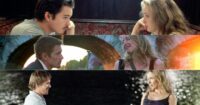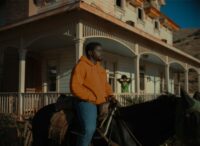Throughout Mel Brooks’ long and illustrious career, he has filled each of his films with a vast and varied number of jokes, gags, and comedic moments of all kinds. Picking out just five of my favorite jokes from his films is no small task, let alone putting them in order, but that’s exactly what I have managed to do. Here are my five favorite jokes, scenes, and generally funny moments from throughout Brooks’ filmography.
5. The Producers—“Springtime for Hitler”
While Brooks had been working in the industry for almost twenty years beforehand as a writer—first on Sid Caesar’s Your Show of Shows, and then for Get Smart, the series he co-created with Buck Henry—The Producers was where it all began for him as a director. And what a beginning it was.
The Producers is the story of Max Bialystock and Leopold Bloom, an aging Broadway producer and his accountant who decide to produce the worst possible play they can get their hands on after discovering that—with the help of some clever accounting and just a touch of possible fraud—one could potentially make much more money off of a flop than a hit.
The play in question? Springtime for Hitler, a musical love letter to Adolf Hitler and the Third Reich, written by a deranged former Nazi. When the curtain goes up on opening night, the show’s opening number is truly something to behold, featuring everything from Brooks’ distinctive voice saying “Don’t be stupid, be a smarty, come and join the Nazi Party!” to a dance routine complete with a Busby Berkeley-style swastika formation, all leading up to the show’s campy portrayal of Hitler himself as a loud-mouthed beatnik—which unfortunately leads to the audience thinking that the show was a satire and it subsequently becoming an unexpected smash hit, unraveling Bialystock and Bloom’s scheme.
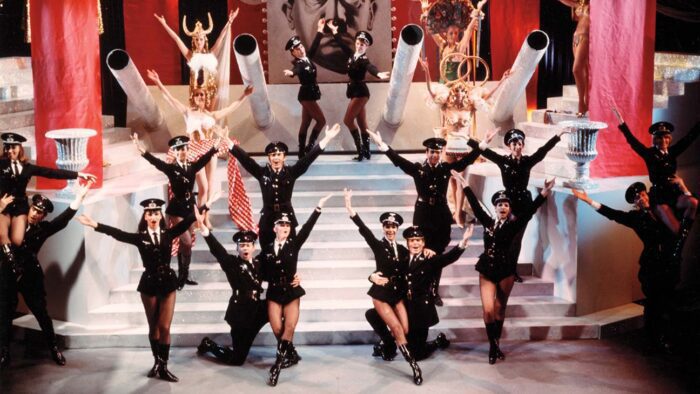
Making fun of the Nazis is something very few would even dare to approach (let alone in their directorial debut) and it’s a testament to the fearlessness that would be present throughout every single one of his films—if your starting point is making fun of the Nazis, one could reasonably expect that going forward, nothing is going to be off limits or too far in terms of what subject matter you might take aim at.
“Springtime for Hitler” was also meaningful for Brooks, a famously Jewish man whose family was persecuted by the Nazis and lightheartedly “admitted” that he made The Producers to get back at anti-semites. As he would say later in an interview: “More than anything the great Holocaust by the Nazis is probably the great outrage of the 20th century. There is nothing to compare with it. And…so what can I do about it? If I get on the soapbox and wax eloquently, it’ll be blown away in the wind, but if I do Springtime for Hitler it’ll never be forgotten. I think you can bring down totalitarian governments faster by using ridicule than you can with invective.”
4. Blazing Saddles—Around the Campfire
Brooks’ career as a writer and director was filled with groundbreaking moments regarding previously sacred cultural taboos—see the already mentioned “Springtime for Hitler”—but there was only one moment throughout his film career that has the distinction of being both groundbreaking and windbreaking.
Blazing Saddles is, for many, the highlight of Brooks’ filmography, a pitch-perfect satire of the Technicolor westerns that took the racism generally obscured by Hollywood’s western mythmaking and putting it front and center, telling the epic tale of a man named Bart who escapes the hangman’s noose to become the first black Sheriff in the west and a hero to the people of a little town called Rock Ridge, as the assistant governor tries to run them out of town to buy the land on the cheap. But amongst the shootouts, brawls, and horse punches, two particular moments always stand out from this particular film for me—don’t worry, we’ll get to the other one later.
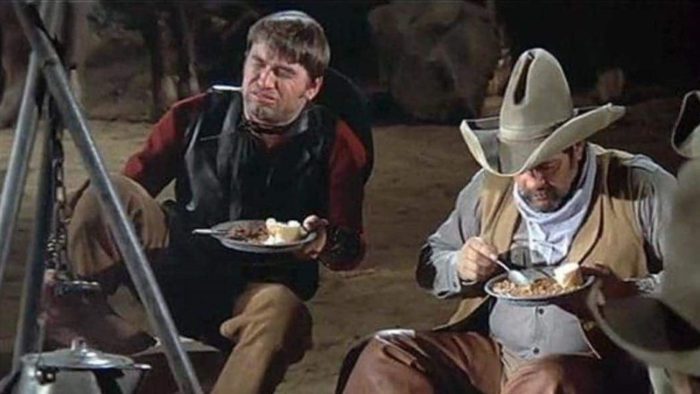
See, the traditional cowboy diet, mainly consisting of beans, happened to be something that Brooks had always wondered about—as he said at the time, “I mean, you can’t eat so many beans without some noise happening there.” So, at about the halfway point of Blazing Saddles, Brooks made history with what is generally recognized as the first farting scene on film, a veritable thirty-second symphony of farts and burps culminating in one cowboy being offered some more beans and proclaiming “I’d say you’ve had enough!”
This scene was one of many moments in Blazing Saddles that Brooks fought with Warner Brothers executives to keep, but thankfully the scene was kept intact for the film’s release, paving the way for scatological humorists the world over—although hilariously, many TV edits would either mute the fart sounds or replace them with the sounds of horses neighing or cows mowing.
3. Young Frankenstein—“Blücher!”
Sometimes, the simplest jokes are the most effective ones, and it’s certainly true when it comes to many people’s favorite Mel Brooks film, Young Frankenstein. Spoofing classic black-and-white horror films—particularly James Whale’s original Frankenstein—Young Frankenstein perfectly captures the melodrama of those classic films while constantly mining humor from said melodrama.
Any number of moments from Young Frankenstein could have made this list: the visit from Inspector Kemp, the monster’s failed birth, the Three Stooges style gag with the classic revolving door/hidden passageway. But this is, after all, a personal favorites list and my personal favorite joke from this movie is its most repeated one. When Frederick, Igor, and Inga first arrive at Frankenstein’s castle, they are met by the sinister Frau Blücher—we know she’s sinister because when she introduces herself, we get that classic horror combination of thunder and lightning with the whinnying of panicked horses.
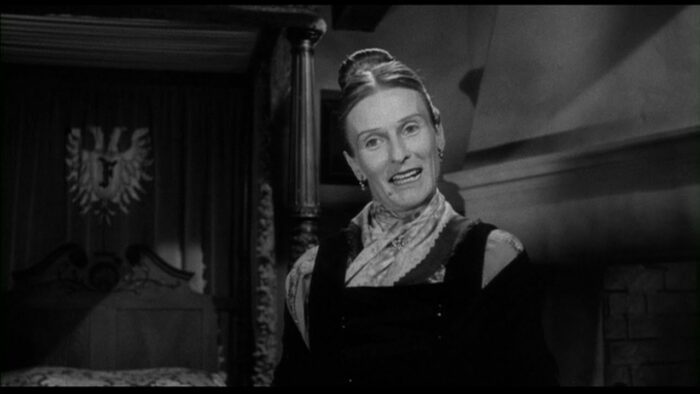
Throughout the rest of the film, every time the name “Blücher” is even mentioned, we hear that same sound effect of panicked horses, no matter where we might be in the castle. It’s a simple, straightforward audio gag that continues to be funny each time you’re hit with it, while turning a classic trope of black-and-white horror into excellent comedic fodder. Even better: Marty Feldman’s Igor is clearly aware of this recurring gag, and before entering the castle with Frankenstein and the others can’t resist looking back for one last “Blücher!” before going on his way with a smile on his face.
2. Spaceballs—Merchandising!
Spaceballs, Brooks’ send-up of the Star Wars films (along with a couple of other sci-fi epics for good measure) was my first exposure to the director’s work—on a personal note, a PG rating was a very different thing back in the ’80s and not necessarily appropriate to be viewed by a young and impressionable twelve year old. While most of Brook’s jokes and sendups have thankfully gotten better with age, Spaceballs contains the one that might be even more accurate today than it was back when the film was first released.
After Lone Starr, Barf, Princess Vespa and Dot Matrix finally reach the hideout of the mysterious Yogurt (a Yoda sendup, naturally played by Brooks), he reveals to them the true nature behind his work: merchandising. “We put the picture’s name on everything! Merchandising, merchandising, where the real money from the movie is made,” Yogurt proclaims as he shows off everything from Spaceballs: The T-Shirt to Spaceballs: The Flamethrower.
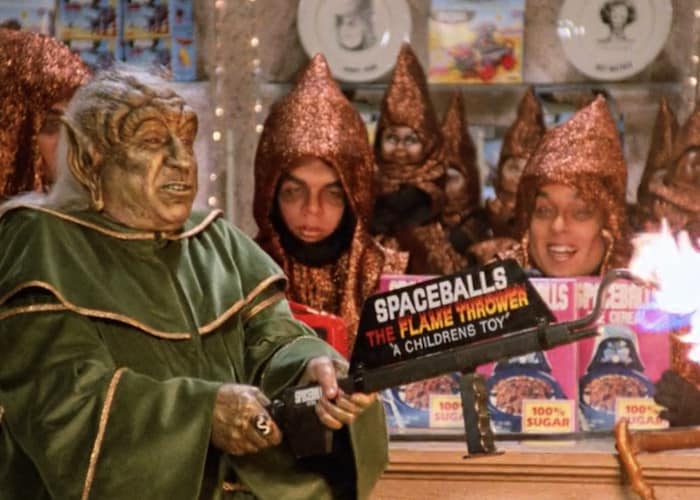
This joke actually has a fairly direct story behind it: just as he had contacted Alfred Hitchcock when he made High Anxiety, Brooks had sent the script for Spaceballs to George Lucas, if not necessarily to get his blessing then to let him know what he was planning to do in regards to parodying Star Wars. Lucas was a fan of Brook’s previous films Blazing Saddles and Young Frankenstein, and not only gave Brooks’ his permission to parody Star Wars but also offered the services of Industrial Light & Magic to handle the space effects and post-production. His one caveat: he didn’t want Brooks to do any merchandising or action figures that might potentially compete with Star Wars figures, as Lucas had made his fortune by securing the merchandising rights for the franchise.
Not only did this exchange directly inspire Yogurt’s obsession with merchandising, but it’s also almost certainly more accurate now than it ever was back in 1987. Disney’s acquisition of both Lucasfilm and the Star Wars franchise has led to an explosion in merchandise for the series, not to mention an entire Star Wars land in both the Disneyland and Walt Disney World parks that they would be more than happy you visit, turning roughly three films and a few television shows into an unstoppable juggernaut of merchandising—and, for a bit of irony to top it all off, Spaceballs wound up being one of the more financially successful films of Brooks’ career after the film gained a cult following years after its release.
1. Blazing Saddles—The Tollbooth
Finally, at the top of my list is what is not just my favorite Mel Brooks joke of all time, but quite possibly my favorite joke of all time, full stop. No funny story or anecdote here, just one of the funniest things I have ever seen. The tollbooth scene from Blazing Saddles is nothing short of a masterclass in comedy, the humorist’s equivalent of a seven-layer dip that reaches Monty Python levels of outright absurdity.
After his previous plans to drive the citizens of Rock Ridge out of town have failed, the villainous Hedley Lamarr decides that the time has come for a more drastic and direct approach, rounding up a mob constituting the most villainous wretches he can get word to, everyone from Klansmen and Mexican bandits to Nazis and Methodists. When the citizens of Rock Ridge see that the mob is rapidly approaching the fake version of the town they have built to trap them, leaving them no time to finish, Bart and his sidekick the Waco Kid hatch a plan to buy them some more time: a tollbooth, constructed out in the middle of the desert.
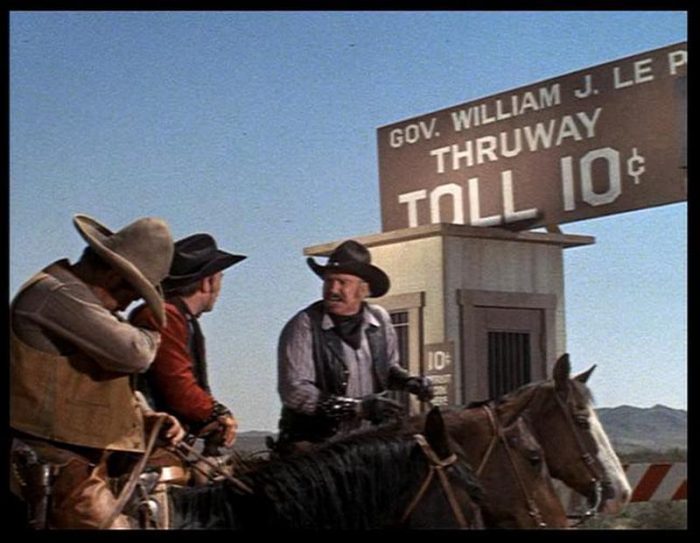
The beauty of the tollbooth is that every little thing you think about simply reveals another layer of the joke. How did Bart and Jim build a working tollbooth in so little time? Why does this mob of ne’er-do-wells respect the authority of a tollbooth? Why don’t they simply go around the tollbooth through the wide-open desert on either side? Why don’t they just insert one dime and then all go through? I’ve watched some full-length films with less depth than what Brooks and company pack into this roughly thirty-second gag, and my preferred example of just how damn funny Brooks could be at his peak. It’s a joke that I still analyze to this day, and hands down my favorite out of any Mel Brooks film.
Is there any particular joke from one of Brooks’ films that stands out for you? Feel free to share in the comments below!


